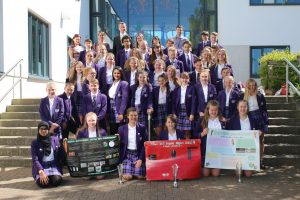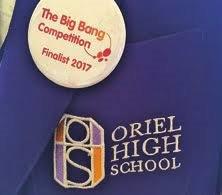Head of Faculty
Miss V Pooley – vpooley@oriel.w-sussex.sch.uk
Deputy Head of Faculty
Mr T Bayle – tbayle@oriel.w-sussex.sch.uk
Teaching Staff
Mr R Pullin – rpullin@oriel.w-sussex.sch.uk
Mr J Swales – jswales@oriel.w-sussex.sch.uk
Mr K Davis – kdavis@oriel.w-sussex.sch.uk
Miss H Everitt – heveritt@oriel.w-sussex.sch.uk
Mrs S Holmes – sholmes24@oriel.w-sussex.sch.uk
Mrs S Jones – sjones@oriel.w-sussex.sch.uk
Mr C Coxhill – ccoxhill@oriel.w-sussex.sch.uk
Mr G Creese – gcreese@oriel.w-sussex.sch.uk
Ms L Mannion – lmannion@oriel.w-sussex.sch.uk
Mr A Boczek – aboczek@oriel.w-sussex.sch.uk
Mr G Rix – grix@oriel.w-sussex.sch.uk
Mr L Taft – ltaft@oriel.w-sussex.sch.uk
Miss I Pazitna – ipazitna@oriel.w-sussex.sch.uk
Mr C Chatfield – cchatfield@oriel.w-sussex.sch.uk
Miss H Doupe – hdoupe@oriel.w-sussex.sch.uk
Miss H Visagie – hvisagie@oriel.w-sussex.sch.uk
Mrs M Lindridge – mlindridge@oriel.w-sussex.sch.uk


Subject Overview
Science is the human effort to understand, or to understand better, the history of the natural world and how the natural world works. Therefore, we aim to equip our students with the skills to be able to investigate scientific problems for themselves and make decisions centred around scientific issues as well as learn the biological, chemical and physical concepts that underpin life as we know it.
In the science department our ethos is based on Creativity, Achievement, Respect and Excellence (CARE). Promoting creative thinking amongst our learners enables pupils to take the learning from within the classroom into their everyday lives promoting development of transferable skills such as problem solving, critical thinking and effective decision making. The ability to think creatively directly links into our belief that all pupils have the ability to achieve and exceed their potential. This is achieved through collaborative learning founded on mutual respect from all members of the school community, learners, staff and carers alike. Through full commitment to the ethos we strive for excellence from ourselves, learners and wider community, all of us continuously striving to improve.
The curriculum has been written with the aim of developing lifelong learners who demonstrate a curiosity about the natural world; possess the skills and scientific knowledge required to understand the role of science in our everyday lives and its scope for developments in the future.
Whilst we aim for all students to achieve their very best at the end of Key Stage 4 in order that they can progress onwards to their chosen further study route, our curriculum is not just focused on exams; we strive to instil a love of science in all our learners and our ultimate aim is for their scientific knowledge and understanding gained at Oriel to support their perception of the world around them as they become young adults and beyond.
Key Stage 3
In Key Stage 3 students follow a scheme of work written specifically for Oriel High School, this builds on the skills and knowledge that they gained during primary school and is written to prepare students fully for the demands of the new GCSE examinations that they will sit.
Students complete a term of Biology, a term of Chemistry and a term of Physics, each term is split into 3 topics with each topic covering a main theme in the subject. Teaching is not simply from textbooks but utilises a wide range of activities including a large proportion of practical investigative work. The structure of these practical experiments mirrors the format of the GCSE core practicals, so that our Key Stage 3 students have a valuable head start when entering Year 10.
How Do We Envisage Progress?
Students will be knowledgeable about the key concepts that underpin the three scientific disciplines, including relevant practical scientific techniques and procedures.
They will be able to apply their knowledge and understanding of these ideas and techniques to familiar contexts, becoming increasingly more confident in these skills.
Using these skills they will be able to interpret data sets, make judgements and draw conclusions using these and develop, improve and evaluate familiar experimental procedures. All within the scope of the content covered during year 7 – 9. Students will have the knowledge, skills, understanding and resilience required to progress effectively onto KS4 GCSE programmes of study
For a more detailed breakdown of our Key Stage 3 curriculum please click on the links below:
Key Stage 4
At Oriel we teach the Pearson Edexcel GCSE (9-1) Sciences. The majority of students sit the GCSE Combined Award (also known as ‘Double Award Science’), in which students study all three sciences (Biology, Chemistry and Physics) but end up with two GCSEs. The majority of GCSE students in England follow the Combined Award course, which covers approximately two thirds of the content covered by our Triple Award Science students.
Around 25% of our Key Stage 4 pupils undertake the Triple Award Science (sometimes known as ‘Separate Sciences’ or ‘Single Sciences’). This is where students study all three sciences and end up with three GCSEs.
How Do We Envisage Progress?
Building on previous knowledge from KS3, students will have developed the complexity of their knowledge surrounding the key concepts underpinning the three scientific disciplines, including more involved practical scientific techniques and procedures.
They will be able to apply their broadened knowledge and understanding of the key scientific ideas and techniques to familiar and unfamiliar contexts, showing confidence in these skills.
They will be able to interpret complex data sets, make reasoned judgements and draw evidence based conclusions. They will be able to develop, improve and evaluate familiar and unfamiliar experimental procedures suggesting improvements that will result in higher quality data. All within the scope of the content covered during year 7 – 11 Students have the knowledge, skills, understanding and resilience required to continue onto their chosen path regardless of subject choices equipped with the transferable skills that will aid in their success moving forwards.
For further information of our Key Stage 4 Science curriculum please click on the following links:
Key Stage 5
Science continues to be a popular subject as our pupils enter our Sixth Form, with students pursuing science A-levels to progress onto careers in medicine, engineering and the science industry. The courses are taught by specialist members of staff in full size laboratories and classrooms. All students are given the chance to take part in a wide range of visits from science conferences to university lab visits and natural science field trips.
A-level courses are available in Biology, Chemistry, Physics and Psychology with progression for students who wish to follow a more vocational route being available in the form of a BTEC level 3 in Applied Science and a BTEC level 3 in Applied Human Biology.
Learning Outside the Classroom
Extra-Curricular and STEAM
Equally important as our taught curriculum is the vast range of experiences and opportunities that Oriel High School has on offer. Continuing this ethos, we are justifiably proud of the extra-curricular and enrichment activities available to our science students of all ages.
Highlights include:
The Oriel KS3 Science Fair
Running since 2013, the Oriel Science Fair has been a huge success which creates life long memories. Key Stage 3 pupils spend two weeks in science lessons planning, developing and testing investigations of their own devising. As long as the investigations are safe, able to be completed in a school laboratory and related to science, then no topics are off limits!
The project voted the best in the class wins a place in the final at the Science Fair held in the main school hall. Finalists then spend the day presenting their projects to their peers, as well as a judging panel formed of prominent members of local STEM companies.
The winners are treated to a trip, with the first place contestants from each of the year groups being entered in the Big Bang Fair South East (the biggest Science and STEM festival in the UK) where they have the opportunity to take their projects to a national competition. We are very proud to say that numerous Oriel Projects have gone on to compete nationally, we’ve even had part of a year 7 project being sent into space!
The next science fair is fast approaching – what will you choose to investigate?
World Space Week and British Science Week
In October, pupils get the chance to celebrate all things cosmic! World Space Week (October) is the largest space event on Earth and at Oriel it’s a celebration of all things SPACE. The events focus on science and technology and the roles they play in the past, present and future of mankind.
Space Week consists of extra-curricular activities during and after school. Past highlights have included Virtual Reality tours of our solar system, asteroid strike studies and lunar landing investigations.
Budding Oriel scientists also have the opportunity to get involved in a ten-day celebration of science, technology, engineering and maths, featuring entertaining and engaging events and activities across the school.
Organised by the science department, the celebration includes after school science experiments and demonstrations. Hands on activities and opportunities to enter national competitions. A trip to the Natural History Museum in the summer term is up for grabs for the most engaged and enthusiastic pupils.
The School Garden / Eco Club
Over the past few years, teachers and pupils have worked tirelessly to transform an area of scrubby grassland next to the tennis courts into the magnificent school garden. A team of willing volunteers from the Art Department, the Youth Wing and the after-school Eco Club have planted an array of different fruits and vegetable plants whilst also maintaining the garden. The garden is frequently used as part of the Forest Schools program, a place for still-life drawing for the Art Department and can be used as an outdoor classroom for any subject should the lesson fit.
